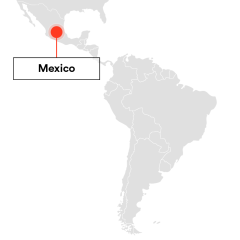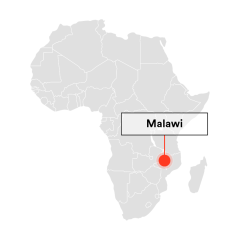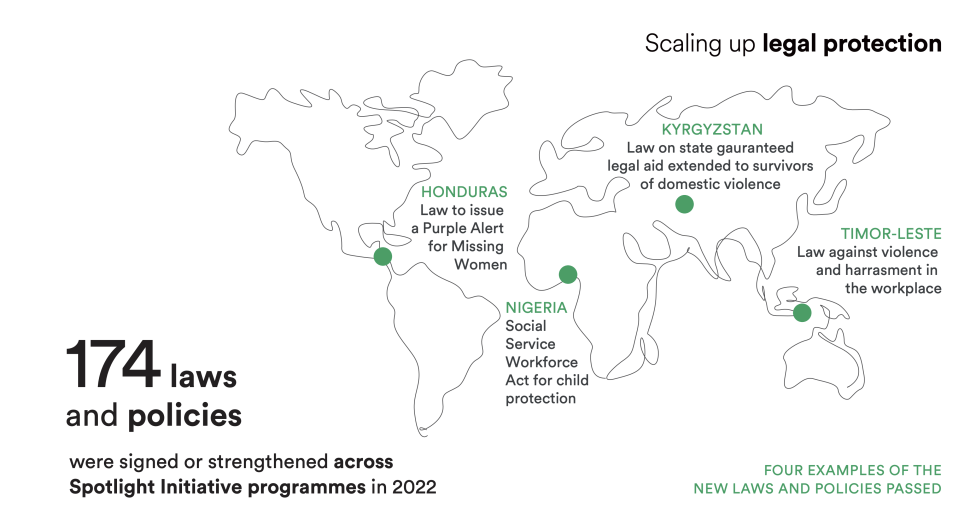Reform legislation to end VAWG

Reform legislation to end VAWG
Case Studies

In response to the alarming rise in femicides in Mexico, particularly in Chihuahua State, Spotlight Initiative worked to strengthen legal frameworks against gender-based violence. Despite existing laws like ‘Norma Oficial Mexicana’ and the General Law on Women’s Access to a Life Free of Violence, femicides continued to increase, driven by deep-rooted gender inequalities and weak law enforcement.
Spotlight Initiative undertook a comprehensive assessment of Chihuahua’s legal policies with Grupo de Accion por los Derechos Humanos y la Justicia Social A.C. (Action Group for Human Rights and Social Justice), a Spotlight Initiative implementing partner. The assessment led to the identification of priority issues, significant gaps and recommendations for legal reforms aimed at providing better protection for women and support for children orphaned by femicide.
Spotlight Initiative also forged a partnership with the Congress of Chihuahua, securing their buy-in for the recommended legal reforms, including:
- Assistance from childcare centres and reparation of children who lost their mother from femicide.
- Delegation of the Protection Attorney’s Office to represent victims of femicide and child femicide to ensure justice and secure any reparation from the government for their surviving families.
- Commitment to develop a system to register femicide risks and cases.
In August 2021, the Congress of Chihuahua approved the legislative reforms recommended by Spotlight Initiative and its partners. The success of the intervention was largely due to its targeted and participatory approach. By focusing specifically on the region with the highest femicide rates and engaging stakeholders with direct experience of the issue, Spotlight Initiative was able to make informed and impactful recommendations. The collaboration with the Chihuahua State Congress not only led to legislative changes but also heightened awareness and commitment among key decision-makers.



Spotlight Initiative in Malawi helped contribute to strengthening the legal framework to protect women and girls from violence. A landmark achievement was the amendment of the Penal Code. The amendments included the redefining of the age of a child as a person under the age of eighteen years, and prohibiting sexual offences against children and persons with mental disabilities. The amendment, long advocated for by civil society, was propelled forward by the effective mobilisation of government ministers, demonstrating Spotlight Initiative’s role in bridging the gap between civil society’s demands and government action.
Another example of the impact of Spotlight Initiative in advocating for the amendment of key laws and policies is the Ministry of Justice’s adoption of amendments to the Gender Equality Act (2013), which focus on the safety and protection of whistleblowers, complainants, or witnesses of acts of sexual harassment in the workplace.
Other reviewed laws include the Prevention of Domestic Violence Act (2006), the Childcare, Protection and Justice Action (2010), and the Marriage, Divorce and Family Relation Act (2015), which have had bills drafted and are pending tabling in parliament having been finalised and presented to Parliament.
Spotlight Initiative in Malawi also played a crucial role in empowering traditional and community leaders to reform legal frameworks and end harmful practices against women and girls. This initiative included training 493 leaders across six districts to develop and revise by-laws. As a result, 52 by-laws focusing on sexual and gender-based violence, reproductive health rights, and early marriage were adopted. These by-laws, aligning with major legislation such as the Gender Equality Act and Prevention of Domestic Violence Act, helped in prohibiting or amending harmful practices. Widespread advocacy and awareness campaigns also helped raise community understanding of these laws.








